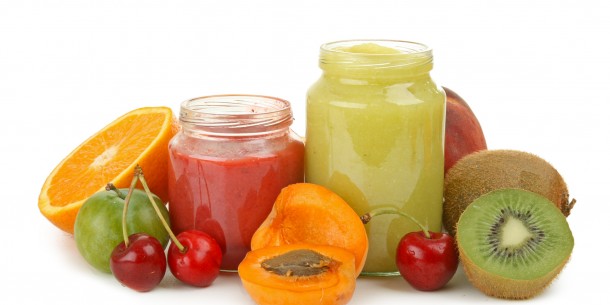You can us this article to know what foods to introduce to your newborns.
Six Months
At six months foods are introduced into the breast feeding regime. Several qualities are desirable:
- Generally, hypoallergenic foods should be used
- Easy chewability
- Reasonably iron-rich
- Adequate fibre and fluid levels for the heath of the colon
With these ideas in mind, the following foods have been chosen as appropriate foods to introduce at six months:
- Prunes: Fibre, iron, vitamin C, fluid, calcium
- Cherries: Fibre, iron, vitamin C, fluid
- Banana: Potassium, iron, chewability
- Blackberry: Fibre, iron, vitamin C
- Carrot (cooked and mashed): Fibre, carotenes, calcium
- Mung bean sprouts (blended): Iron, fluid, fibre, enzymes
- Broccoli (cooked, mashed or blended): Iron, fibre, chlorophyll, potassium, calcium
- Cauliflower (cooked, mashed, or blended): Iron, bulk
- Applesauce: Pectin, fluid, fruit sugars
- Grapes: Vitamin C, fluid, fruit sugars
- Yam: Carbohydrate, carotenes, potassium
- Pears: Vitamin C, fibre, fruit sugars
- Kiwi: Vitamin C, fluid, enzymes
- Green peas: Iron, fibre, chlorophyll, calcium
Nine Months
Substantial growth and maturation of tissues occur at nine months. Iron and zinc foods are emphasized as well as maintaining hypo-allergenicity in food choices. High bulk and fibre are encouraged for good intestinal health. The intestinal bacteria change as we add more foods from Bifido-Bacterium bifidus to Bacteriodes, clostridium, staphylococcus, E. coli, and other lactobacillus species. A high fibre diet encourages a smooth transformation to these bacterial types. Introduce these foods one at a time, watching for reactions such as diaper rash, behavioural changes, skin rashes on body or mouth, runny nose, or watery eyes.
Following are the foods to be introduced at nine months:
- Papaya: Vitamin C
- Oatmeal: Zinc, protein
- Lima beans: Zinc, protein
- Split pea soup: Zinc, protein
- Mashed potatoes: Complex carbohydrate, protein
- Basmati rice: Complex carbohydrate, protein
- Artichoke: Carbohydrate, protein, vitamin A, phosphorus, potassium
- Cabbage: Fibre, vitamin A, potassium
- Sweet potato: Carbohydrate, carotenes, fibre, potassium
- Millet: Complex: carbohydrate, protein
- String beans: Bulk, magnesium
- Blueberries: Fibre, Vitamin C
- Nectarines: Vitamin A, potassium
- Chard: Magnesium, chlorophyll, bulk
Twelve Month Foods
Twelve month foods, like nine month foods, are high in fibre, zinc, and complex carbohydrates. Again, check for allergic-type reactions such as skin rashes, runny nose and behaviour changes. Protein and iron are also emphasized.
- Acorn squash: Carbohydrate, fibre
- Blackstrap molasses: Iron
- Tofu: Protein
- Asparagus: Fibre, protein, vitamin A, niacin, potassium, manganese
- Avocado: Oils and good fats
- Barley: Carbohydrate, phosphorus, magnesium, protein
- Spirulina: Protein, chlorophyll
- Brown rice: Carbohydrate, protein, fibre, vitamin B complex, potassium
- Swiss chard: Magnesium, fibre
- Parsnips: Bulk, vitamin A, plant pigments
- Goat’s milk: Protein, vitamin A, vitamin B complex, potassium, calcium, zinc
- Yogurt: Calcium, protein, some B vitamins, zinc
- Hubbard squash: Carbohydrate, protein, vitamin A, potassium
Eighteen Month Foods
The eighteen month foods include foods high in protein. The molecular structures are getting more complex. These foods emphasize calcium and B vitamins as well.
- Tahini: Oils, protein, iron
- Kelp: Protein, trace minerals
- Beet greens: Chlorophyll, fibre, pigments, some iron
- Beans: Carbohydrate, protein
- Lamb: Protein, iron
- Eggplant: Fibre, carbohydrate
- Chicken: Protein, B vitamins
- Fish (all kinds, introduced one at a time): Protein, iron
- Spaghetti squash: Carbohydrate
- Various greens: Magnesium, fibre
- Rye: Carbohydrate, protein, fibre, sodium
- Mushrooms: Fibre, copper, zinc
- Rutabaga: Carbohydrate, pigments, carotenes
- Buckwheat: Carbohydrate, fibre, B vitamins
Twenty-one Month Foods
At this stage, much growth is occurring. Here we begin to fill out the proteins so that the protein foods can be rotated. Essential fatty acid rich nuts are introduced as nut butters.
- Eggs: B12, protein, cholesterol
- Beef liver: B12, iron, protein, B vitamins
- Cashew butter: Protein, essential fatty acids
- Almond butter: Protein, essential fatty acids
- Game hen: Protein
- Salmon: Protein
- Oranges: Vitamin C, bioflavonoids
- Turkey: Protein
- Pineapple: Vitamin C
- Brewer’s yeast: B3 vitamins
- Crushed walnuts: Essential fatty acids, protein
- Wheat (sprouted Essene bread is good): Enzymes, sugars, proteins
Twenty-four Month Foods
This completes the list of foods. Any fruit or vegetable may be added that has not appeared on previous lists. Be sure to continue to watch for allergic symptoms as mentioned above.
- Sunflower seeds: Essential fatty acids, protein
- Peanut butter: Essential fatty acids, protein
- Lentils: Fibre, protein
- Duck: Protein
- Clams: Minerals, protein
- Cottage cheese: Calcium, protein
- Lamb liver: Iron, protein
- Soy (all forms): Calcium, protein
- Cheese (all types, introduce one at a time): Calcium, protein
- Rabbit: Protein


